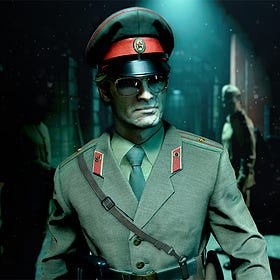Historical Revisionism and Critiques of Video Games - Belated Post-mortem
Respecting the past while not being beholden to it.
It doesn’t get old, looking back on earlier writings, whether because of the fumbles and unseen errors, or the snapshot they provide of my views at the time. In this case, my old Areo Magazine piece on “historical revisionism” and the abuse of history in video game critiques has stood up rather well, even if some of it wears its age not too proudly.
Historical Revisionism and Critiques of Video Games
Disclaimer: This article was originally posted on Areo Magazine on September 18, 2020. This has been republished in light of the publication shutting down business operations on November 6, 2023. On 21 August 2020, Activision released a teaser trailer
If there’s one particular point that wasn’t clearly explained in the piece, it’s that recurring phrase “gaming is political.” As hotly polarizing now as it was while researching for that article, it’s easy to forget how in isolation, it’s not a controversial statement. Video games, after all, have touched on serious and political topics over the past several decades, which includes history. Aside from Sid Meier’s Civilization, you had various Metal Gear titles exploring anti-war motifs in the context of the Cold War, while even the earliest Call of Duty games weren’t shy about showing the murkier aspects of World War II.
The same, alas, can’t be said of how the latter franchise’s last foray into the setting, Call of Duty Vanguard, in 2021. Which is due in no small part to a butchering of the source material that makes the worst bits of Battlefield 5’s campaigns look authentic, but I’m getting ahead of myself.
Problems arise when “gaming is political” is taken as carte blanche for pushing ideologically charged critiques as near-fiat. The reasons can vary, such as abusing “death of the author” to the point of imposing a revisionist view instead of what’s intended. Or alternatively, the notion that not only is there no such thing as a neutral work (or games as fun for their own sake), but that it should also extol the critic’s preferred opinions lest it be deemed “problematic” propaganda.
Moreover, it’s something that transcends partisan rhetoric. Following the release of Age of Empires III: Definitive Edition* on October 15, 2020, not long after the Areo article went live coincidentally, discourse around the game became clouded not only due to glitches but also due to creative decisions done ostensibly for historical accuracy and respect toward non-European peoples. “Plantations”, for instance, were renamed as “Estates” in part due to the negative connotations in the United States, while the “Colonial Age” was rebranded as the “Commerce Age”. In one glaring case, Andrew Jackson was even omitted from a playable version of the Battle of New Orleans.
To call this move a misfire at launch would be selling it short, albeit one that improved and got more refined with subsequent updates. Nonetheless, it didn’t stop the game from being the subject of culture war spats. Some chastized the game, especially in its initial state, as having gone woke by pandering to American identity politics. Others, meanwhile, bemoaned how the game either whitewashed colonialism by renaming the Age (despite Definitive Edition’s scope expanding far beyond the original 2005 game), or didn’t go far enough in addressing “problematic” issues.
While there is something to be said about balancing entertainment, historical accuracy and contemporary sensibilities, the way that conversation’s gotten polarized has made approaching the past more akin to walking on eggshells at the best of times. In turn, adding pressure for developers and publishers to either play it safe in the most bland sense, or attempt pandering to such critics so as to be on the “right side” of history, even if only for the perceived profitability.
Which…come to think of it also explains why Call of Duty Vanguard turned out the way it did. Both in terms of how it tried not to be offensive and heavily distorted the actual history of the events portrayed in the name of supposed diversity, as if filling up a checklist of what’s acceptable in ”current year.”
Does it have to be this constant struggle between weaponizing history for modern culture wars, and revising it to suit modern tastes even at the costs of forgetting? I still don’t think so. That would mean respecting the past while not being beholden to it. Something that, alas, some are not yet ready for.
*Disclaimer: I’ve also wrote a review/retrospective of the game for Hardcore Gaming 101 back in 2022.






![Call of Duty®: Vanguard Beta Guide – Tips for Maps, Modes, Weapons, and More [[WEEK TWO UPDATE]] — Call of Duty®: Vanguard — Notizie Blizzard Call of Duty®: Vanguard Beta Guide – Tips for Maps, Modes, Weapons, and More [[WEEK TWO UPDATE]] — Call of Duty®: Vanguard — Notizie Blizzard](https://substackcdn.com/image/fetch/$s_!OlGi!,w_1456,c_limit,f_auto,q_auto:good,fl_progressive:steep/https%3A%2F%2Fsubstack-post-media.s3.amazonaws.com%2Fpublic%2Fimages%2F73c12400-3e16-4001-afe2-0dde1838ca56_1920x1080.jpeg)